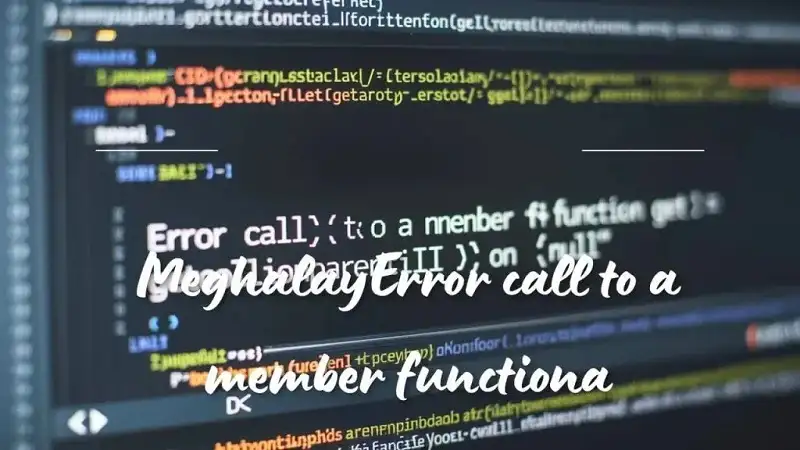error call to a member function getcollectionparentid() on null
Errors in programming can be both frustrating and educational. Among the common issues developers encounter is the error: “Call to a member function getCollectionParentID() on null”. This error can halt the functionality of an application and may seem cryptic to those unfamiliar with its underlying causes.
In this article, we will dive deep into the meaning, causes, and solutions for this error. We’ll also share best practices for avoiding such issues in the future. By the end, you’ll have a thorough understanding of why this error occurs and how to resolve it effectively.
What Does the Error Mean?
The error “Call to a member function getCollectionParentID() on null” typically occurs in object-oriented programming languages like PHP. This error arises when an attempt is made to call the getCollectionParentID() method on a null object.
To break it down:
- Member function: Refers to a function (or method) that belongs to a class.
- Null: Indicates that the variable or object being referenced has not been initialized or does not exist at the point of the function call.
In this context, the system is trying to execute getCollectionParentID() on a variable that is null, resulting in the error.
Common Causes of the Error
Several factors can lead to this error. Let’s explore the most frequent scenarios:
1. Uninitialized Object
One of the most common reasons for encountering this error is attempting to call a method on an object that has not been properly instantiated. For example:
$collection = null;
$parentID = $collection->getCollectionParentID(); // This triggers the errorIn this case, $collection is null, so calling getCollectionParentID() is invalid.
2. Database Issues
When working with dynamic content fetched from a database, this error might occur if the query doesn’t return the expected result. For instance:
- A record may not exist in the database.
- The query might fail due to incorrect parameters.
Example:
$collection = $database->getCollectionByID($id);
if ($collection) {
$parentID = $collection->getCollectionParentID();
} else {
// Handle the null case
}If the getCollectionByID() function fails to retrieve data, $collection will be null, triggering the error.
3. Incorrect Logic in Code
Errors in the application’s logic can also lead to this issue. For example:
- Not validating an object before calling a method on it.
- Overwriting an object with null.
4. Configuration Problems
In frameworks like Concrete CMS, where getCollectionParentID() is commonly used, misconfigured settings can lead to null objects being passed around.
How to Resolve the Error
Resolving the error “Call to a member function getCollectionParentID() on null” requires identifying the root cause. Follow these steps to troubleshoot and fix the issue:
1. Check Object Initialization
Ensure that the object on which the method is being called is properly initialized. Add a check before calling the method:
if ($collection !== null) {
$parentID = $collection->getCollectionParentID();
} else {
echo "Collection is null.";
}2. Verify Database Queries
If the object is being fetched from a database, verify that the query returns a valid result:
$collection = $database->getCollectionByID($id);
if ($collection) {
$parentID = $collection->getCollectionParentID();
} else {
echo "No collection found for the given ID.";
}Log database errors to identify any issues in the query.
3. Debug the Application Flow
Use debugging tools or print statements to trace the application’s flow and identify where the object becomes null:
var_dump($collection);This can help pinpoint the issue.
4. Handle Edge Cases
Ensure that your code handles edge cases gracefully. For example, if the object might not always exist, provide a fallback mechanism:
$collection = $database->getCollectionByID($id);
$parentID = $collection ? $collection->getCollectionParentID() : null;5. Review Framework Documentation
If the error occurs in a specific framework (e.g., Concrete CMS), refer to the official documentation. Frameworks often provide guidelines for handling objects and methods.
Preventing the Error in Future
To avoid encountering the error “Call to a member function getCollectionParentID() on null” in the future, consider implementing the following best practices:
1. Validate Inputs
Always validate input data before using it in your application. This can prevent objects from becoming null due to invalid input.
2. Use Null Coalescing Operators
Modern PHP versions support the null coalescing operator (??), which can simplify null checks:
$parentID = $collection->getCollectionParentID() ?? 'Default Value';3. Implement Error Handling
Use try-catch blocks to handle exceptions gracefully:
try {
$parentID = $collection->getCollectionParentID();
} catch (Exception $e) {
echo "Error: " . $e->getMessage();
}4. Write Unit Tests
Unit testing can help catch issues early in the development process. Test scenarios where objects might be null to ensure the application handles them correctly.
5. Follow Framework Guidelines
When using a framework, adhere to its coding conventions and best practices. This can help avoid configuration or logical errors.
Real-World Example
Consider a Concrete CMS project where the getCollectionParentID() method is used to retrieve the parent page of a given page. If the page ID is invalid or missing, the error may occur.
Problem Code:
$page = Page::getByID($pageID);
$parentID = $page->getCollectionParentID();If $pageID is invalid, $page will be null, leading to the error.
Fixed Code:
$page = Page::getByID($pageID);
if ($page) {
$parentID = $page->getCollectionParentID();
} else {
echo "Page not found.";
}By adding a null check, the error is avoided.
Conclusion
The error “Call to a member function getCollectionParentID() on null” is a common issue in PHP and other object-oriented programming languages. It occurs when a method is called on a null object, often due to uninitialized objects, database issues, or logical errors.
By understanding the root causes and applying the solutions outlined in this article, you can effectively resolve and prevent this error. Remember to validate inputs, handle edge cases, and follow best practices to create robust and error-free applications Read More healthdod.com
